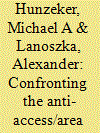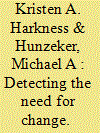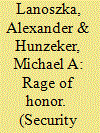| Srl | Item |
| 1 |
ID:
148972


|
|
|
|
|
| Summary/Abstract |
The Baltic States are once again worried that their security is under threat. The US and NATO have responded with air patrols, joint exercises, and battalion-sized ground-force deployments. As important as these efforts have been, they do not fully address Russia’s anti-access/area denial (A2/AD) and precision strike capabilities, both of which undermine NATO’s stratagem for deterring aggression in the first place. Alexander Lanoszka and Michael A Hunzeker assess the current military imbalance and describe two conflict scenarios to show how A2/AD and precision weapons threaten extended deterrence. They conclude with a discussion of the policy implications.
|
|
|
|
|
|
|
|
|
|
|
|
|
|
|
|
| 2 |
ID:
177948


|
|
|
|
|
| Summary/Abstract |
This article addresses a gap in the literature on military adaptation by focusing on the first step in the adaptive process: detecting failure. We argue that institutionalised feedback loops are a critical mechanism for facilitating detection. Feedback loops are most effective when they filter information and distribute lessons learned to senior tactical commanders. In turn, effective filtration depends on incorporating frontline soldiers and specialists into intelligence cells while creating a protected space for dissent. We evaluate our theory against both irregular and conventional wars fought by the British Army: the counterinsurgency campaign in the Southern Cameroons (1960–1) as well as the evolution of British assault tactics on the Western Front of the First World War (1914–18).
|
|
|
|
|
|
|
|
|
|
|
|
|
|
|
|
| 3 |
ID:
143743


|
|
|
|
|
| Summary/Abstract |
Why the First World War ended in 1918 and not earlier remains a major puzzle. We propose a new theory that emphasizes how honor prolongs wars beyond what rationalist theories can explain. It argues that when honor is insulted, an affronted actor will strive to punish the offender. Absent an apology, the pursuit of a satisfactory punishment leads the affronted belligerent to ignore unfavorable battlefield information, hold logically irreconcilable beliefs, process information in emotional terms, and obsess over status. We predict that wars of prevention and territorial occupation are most likely to elicit honor considerations. We test our argument against an obscure episode in the war where Germany and the United States made peace overtures in December 1916. We demonstrate that honor concerns made Entente decision makers see German aggression as an affront to their honor that only the destruction of Germany's political regime could redress.
|
|
|
|
|
|
|
|
|
|
|
|
|
|
|
|